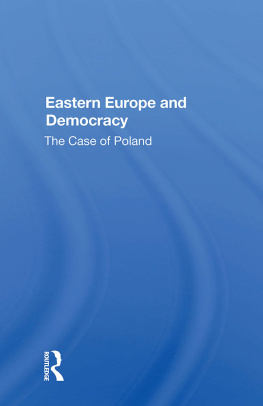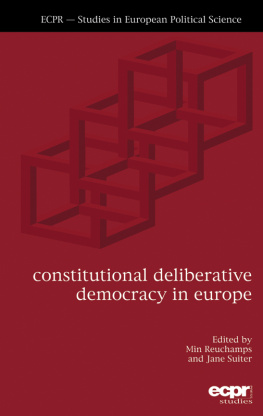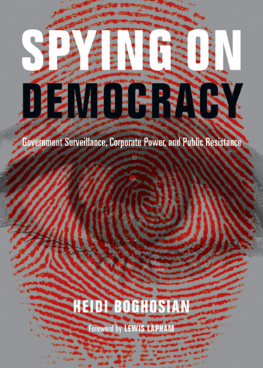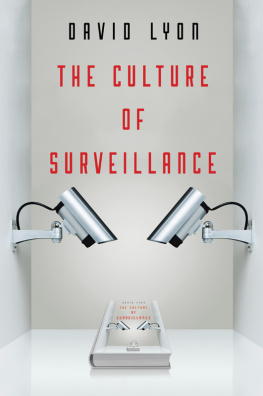Surveillance and Democracy in Europe
Many contemporary surveillance practices take place in information infrastructures which are from the public domain. Although they have far-reaching consequences for both citizens and their rights, they are not always subject to regulatory demands and oversight. This being said, democratic fora where citizens and institutions may question such practices cannot be mobilised without widespread awareness of the dangers and consequences of surveillance practices and who is responsible for them.
Through an analysis of surveillance controversies across Europe, this book not only examines the troublesome relationship between surveillance and democracy, but also highlights the vested interests which maintain the status quo. Using a participatory theory lens, Surveillance and Democracy in Europe reveals the historical, social, political and legal antecedents of the current state of affairs.
Arguing that participation is a sensitising concept which enables a wide array of surveillance practices and processes to be interrogated, this insightful volume will appeal to students and researchers interested in fields such as public administration and policy, political studies, organisational behaviour, and surveillance and privacy.
Kirstie Ball is Professor of Management at the School of Management, University of St Andrews, and co-director of CRISP, the Centre for Research into Information, Surveillance and Privacy (www.crisp-surveillance.com).
William Webster is Professor of Public Policy and Management at the Management School, University of Stirling, and co-director of CRISP, the Centre for Research into Information, Surveillance and Privacy (www.crisp-surveillance.com).
Routledge Studies in Surveillance
Kirstie Ball, William Webster, Charles Raab
https://www.routledge.com/Routledge-Studies-in-Surveillance/book-series/RSSURV
Big Data, Surveillance and Crisis Management
Edited by Chiara Fonio and Kees Boersma
Surveillance, Privacy and Public Space
Edited by Bryce Clayton Newell, Tjerk Timan, and Bert-Jaap Koops
Surveillance and Democracy in Europe
Kirstie Ball and William Webster
CRISP
CRISP (Centre for Research into Information, Surveillance and Privacy) is a multidisciplinary collaborative initiative between the University of Edinburgh, the University of Essex, the University of Stirling, and the University of St Andrews, and is dedicated to studying the many dimensions of the surveillance society. Research conducted by CRISP researchers examines political, legal, economic and social aspects of the surveillance society and its consequences. CRISPs work aims to advance understanding of surveillance, to inform and shape surveillance policy and practice and to encourage ethical surveillance practices.
CRISPs aims are to: provide a platform for world-class social-scientific, legal and other research and knowledge exchange; provide an international focal point for existing and future research; build on synergies, in terms of research projects and interests, between the partner institutions and researchers, thus enhancing research capacity; provide a solid foundation for grant applications and knowledge exchange; provide a lively environment for doctoral training and supervision; provide a platform for engagement with policy-makers and practitioners; engage with the public on relevant issues connected with information processing, surveillance and privacy; and enhance public awareness and understanding of the surveillance and privacy implications arising from the development of new ICTs.
CRISP Directors
Professor Kirstie Ball, University of St Andrews
Professor Pete Fussey, University of Essex
Professor Charles Raab, University of Edinburgh
Professor William Webster, University of Stirling
Contact
Website: http://www.crisp-surveillance.com/
Twitter: @CrispSurv
Email:
First published 2019
by Routledge
2 Park Square, Milton Park, Abingdon, Oxon OX14 4RN
and by Routledge
711 Third Avenue, New York, NY 10017
Routledge is an imprint of the Taylor & Francis Group, an informa business
2019 selection and editorial matter, Kirstie Ball and William Webster; individual chapters, the contributors
The right of Kirstie Ball and William Webster to be identified as the authors of the editorial material, and of the authors for their individual chapters, has been asserted in accordance with sections 77 and 78 of the Copyright, Designs and Patents Act 1988.
All rights reserved. No part of this book may be reprinted or reproduced or utilised in any form or by any electronic, mechanical, or other means, now known or hereafter invented, including photocopying and recording, or in any information storage or retrieval system, without permission in writing from the publishers.
Trademark notice: Product or corporate names may be trademarks or registered trademarks, and are used only for identification and explanation without intent to infringe.
British Library Cataloguing in Publication Data
A catalogue record for this book is available from the British Library
Library of Congress Cataloging in Publication Data
A catalog record has been requested for this book
ISBN: 978-1-138-19552-3 (hbk)
ISBN: 978-1-315-63835-5 (ebk)
This research was conducted as part of the IRISS (Increasing Resilience in Surveillance Societies) project, funded by the European Commission under its 7th Framework programme, project number 290492. It was co-ordinated by Dr Reinhard Kreissl, University of Vienna.
Table 3.1 is reprinted by permission from Springer Nature, Innovation in the Retail Banking Industry: The Diffusion of Credit Scoring, Bofondi, M. & Lotti, F., Rev Ind Organ (2006) 28: 343. https://doi.org/10.1007/s11151-006-9101-0.











